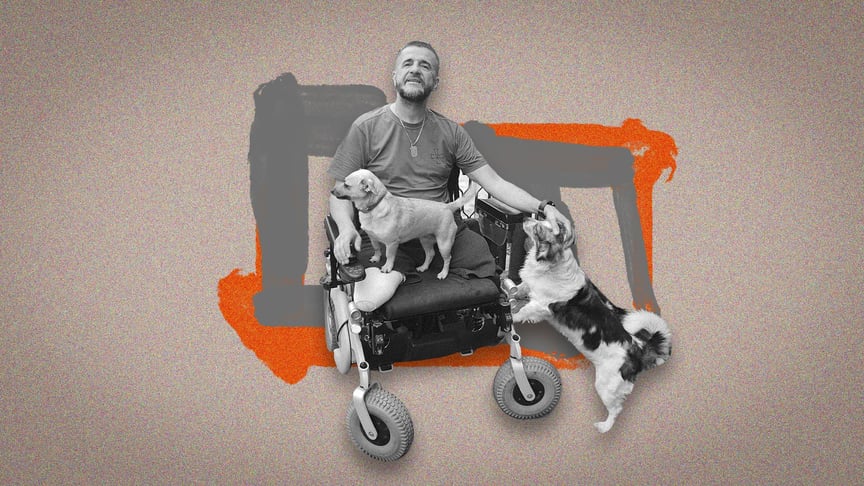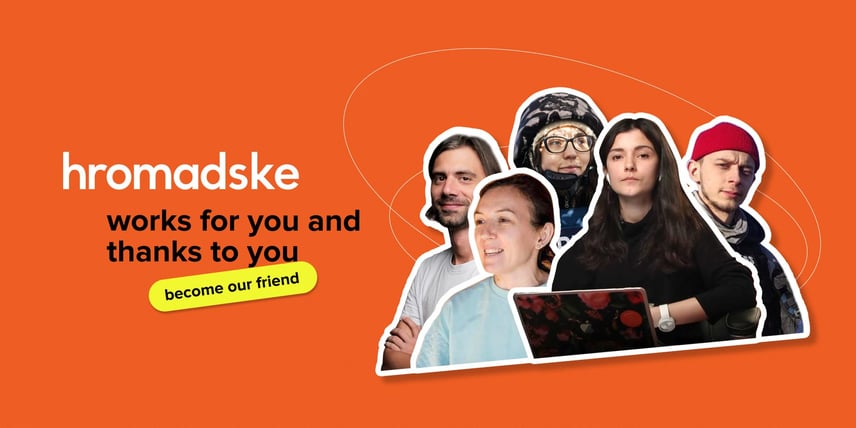“Life outside the hospital is cruel”. How a seriously wounded man learns to live in a new way

“Sorry, sorry, ma'am, but no. I don't take money. We are not standing with outstretched hands yet,” 57-year-old heavily wounded soldier Oleh Dubovyi from Ternopil region stops the hand of a passerby who tries to throw a 100-hryvnia bill into his bag of vegetables and berries. Oleh is in a wheelchair. On March 9, 2023, he lost both legs near Bakhmut when a shell hit his dugout.
Five months have passed since then. Oleh and I are walking through a grocery market in a residential area of Lviv. It's not far from the National Rehabilitation Center “Unbreakable”, where Oleh underwent a month and a half of rehabilitation and learned to use a wheelchair.
“A trip to the market is necessary to feel life outside the hospital, our reality,” explains Vitalii, an instructor at the center.
“And what is our reality?” I ask.
“It’s cruel,” Vitalii smiles ironically.
Oleh adds: “A sad, sad reality.”
“Pity and indifference kill”
Most of the time after his injury, Oleh spent in hospitals. Now he is getting used to life outside the medical walls. When he was being treated in Ternopil, he went for a walk near the city lake only once. But very quickly he wanted to go back to the hospital. He was annoyed by groups of men with beer. It seemed that there was a lot of human indifference around, that the townspeople had forgotten about the war.
Another extreme that triggers him is a pity. Oleh perceives attempts to hand him money as identifying him as a beggar. Although he understands that this is how people want to support and thank him. He says that a simple “thank you” is enough for him.
While we are talking near the market, an elderly woman walks around us, stops behind us, looks at Oleh, and crosses herself — she seems emotionally affected.
“How do I know why she is crossing herself…” the man shrugs. “But I repeat: neither indifference nor pity should be shown to seriously wounded soldiers.”
“Because when you go down from the curb, the impact is on the whole body.”
Indifference can be felt even in every unpatched pothole on the sidewalk, or in people who do not give way to a wheelchair because of their inattention or unwillingness.
“There are a lot of obstacles, ranging from manholes, pits, puddles, curbs. And ending with people who just walk and don't give way — and we have this all the time,” says Vitalii, the instructor.
On the way to the market, he tells Oleh how to react to each obstacle. He advises him to drive around a manhole or a small puddle because any bump on the sidewalk or road is an additional strain on his back and arms.
“I'm stuck...” Oleh was confused when the front wheels of the wheelchair turned perpendicularly while descending from the curb. For Oleh, the most difficult obstacles are just such descents.
“Because the impact is on the whole body during the descent,” theinstructor explains.
A moment later, after crossing the road, Oleh gets stuck on the curb. Vitalii has to push the wheelchair again.
“Oh, I strained my shoulder a little bit,” Oleh tries not to complain, but he can't help it, because he strained his back on this climb.
I ask Vitalii how the man is going to ride without the help of an instructor after discharge. He is sure that Oleh will overcome 90% of the obstacles on his own, and the rest will just have to be avoided. Oleh agrees that sometimes it's better to take an extra hook, but not to take risks when overcoming a difficult obstacle.
In the middle of the market, Oleh pulls off to the side of the stalls to rest. Less than a kilometer from the hospital to the market made him very tired.
“It's one thing to ride on a flat road, and another thing to ride on a road like the one we're on,” the man shrugs.
Vitalii notes that even the street infrastructure that was built for barrier-free movement of people with disabilities is not perfect: 70% of it does not meet the standards.
“Especially ramps that are impossible to ride on, because there is a high risk of falling,” Vitalii clarifies.
We look back at the ramp at the entrance to the supermarket. Vitalii praises it: he says the angle of inclination is optimal (no more than 30 degrees). At the same time, Oleh adds that if it were narrower, it would be convenient to hold the handrails with both hands while going up.
But he is happy about this one too. Because before that, they had passed a ramp with no handrails and a very steep slope near a small grocery store that was no longer accessible to Oleh.
Oleh does not yet know what it is like to ride on the ramps in winter when it snows. Vitalii explains that if the snow is not removed and just sprinkled with sand, the wheelchair will slip.
“People get used to good things quickly, and it turns into a bad habit”
Oleh stops at a fruit and vegetable stand and orders half a kilogram of apricots. The seller weighs them but refuses to take any money.
“Do you think if I'm this one, I'm done? Thank you, but I don't want to take it for free,” Oleh responds, finally convincing her to take the money.
A few minutes later, a woman approaches him and gives him a bag of blueberries. Oleh is shy, but the woman is relentless.
“They deserve it” she explains. The man thanks her and promises to treat the boys in the hospital.
“People get used to good things quickly, and it becomes a bad habit,” adds Oleh. He says that overprotection is ultimately harmful. Because then you can relax and lie on the couch all your life, waiting for handouts.
Therefore, Oleh tries to be as independent as possible. He refuses any household help when he can do it himself. He often stops his wife who wants to help. She has been accompanying him to hospitals since the first days of his injury.
“The main help is just talking”
Oleh's wife Natalia Dubova has a large tattoo on her right arm that reads “My Family is My Life”. She supported her husband when he, a retired diesel locomotive driver, went to the military enlistment office on the first day.
“Although many were surprised that he left right away. They say he was always calm. And some used to beat themselves in the chest and hide now.”
Natalia smiles and jokes a lot, creating a cheerful atmosphere around her husband.
“In one hospital or another, people often notice that I am so positive and smile. Should I cry or what?” Natalia wonders.
She is happy because her husband survived such an injury. Although, when a fellow soldier in the dugout was applying the tourniquets to him, Oleh simultaneously took off his wedding ring and asked him to give it to his wife: he was not sure he would survive.
“He and I were always on the same page. From the first minute, I was smiling. Although Oleh probably thought that I would see him and cry. But when I came into the ward after he was wounded, he turned to me, smiled, and I smiled back. We concluded that everything would be fine,” Natalia says.
Natalia has almost learned to cope with her desire to overprotect her husband.
“I try to restrain myself because I see that he can and wants to. The only thing I rush to help with is safety. When we were at home for a few days between visits to hospitals, I used to run up and try to keep him safe. Because so far, we haven't had time to re-equip everything at home to make it as safe as possible,” says Natalia.
She has already bought a new refrigerator so the freezer is at the top and the main food is at the bottom. She has also ordered craftsmen to build ramps to the front door of her house. She plans to remodel her shower room and bedroom.
After five months with her husband and observing other wounded, Natalia realized what these people need the most.
“Just communicate with them, talk to them. Talk about nothing, but talk, just like with ordinary people, without focusing on their injuries. In hospitals, sometimes strangers would come, sit down and talk to him. Maybe it was easier for them because they didn't know him. Because there are people who were friends with Oleh, but never called or visited him,” Natalia says.
“Maybe they're just afraid to take the first step?” says Oleh with a smile.
Natalia also asks to perceive people with amputations “as ordinary people”.
“They are like everyone else. Oleh doesn't like to feel different,” hiswife emphasizes.
The absence of two knees is an extremely difficult case for prosthetics. However, the family found an American clinic that agreed to put Oleh back on “his feet”. Natalia believes that her husband will receive the best prostheses there.
You can help Oleh Dubovyi with the prosthetics fundraiser here.
- Share:

